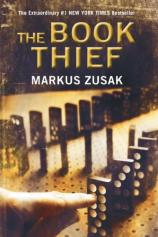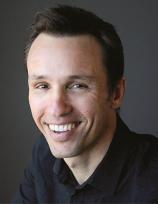The Book Thief
Review
The Book Thief
"A human doesn't have a heart like mine. The human heart is a line, whereas my own is a circle, and I have the endless ability to be in the right place at the right time. The consequence of this is that I'm always finding humans at their best and worst. I see their ugly and their beauty, and I wonder how the same thing can be both."
So muses the narrator of Markus Zusak's powerful and moving bestselling novel of 2006, THE BOOK THIEF, which is now out in paperback. As you might guess, this is no ordinary narrator. The contemplative first person guiding you through this book is Death, an at-once fitting and ironic vanguard for a tale that both celebrates the power of words and agonizes over the consequences of their use.
Set against the tragedy-stained canvas of World War II, Death tells the story of young Liesel Meminger (the eponymous book thief) growing up in Nazi Germany under the watchful eye of a staunch foster mother and kindly foster father who teaches her to read. She attends meetings of the BDM, a youth group aimed at indoctrinating young girls into Hitler's ideology. She plays soccer with the boys on her street, holding her own in any disputes that arise. And all the while, dreams of her dead brother haunt and goad her into a fascination with reading and words that inevitably leads to her life of crime.
As she settles into her new home, Liesel befriends Rudy Steiner, a boy her age who becomes known for his love of Olympic runner Jesse Owens (Rudy paints himself black and runs through the town's streets). Together, they navigate the confusing world set before them by the adults in their lives and attempt to come to terms with the racism prevalent in their homeland's current political state. Liesel also makes the acquaintance of the mayor's wife, whose pristine library astounds Liesel and becomes an open playground for Liesel's "thievery."
It is a meeting with Max Vandenburg, a 24-year-old Jewish man being hidden in Liesel's basement by her compassionate foster parents, that alters the course of Liesel's life. Max, too, is haunted by nightmares of a family he lost in the harrowing aftermath of Kristallnacht. Together, Max and Liesel discover a shared love of words that leads to a decisive understanding about the role words play in both bravery and cowardice. Each, in their own way, sets out to use this knowledge to shape the world around them.
While other writers have employed Death as a narrator, Zusak makes his own indelible mark on the technique in the dimensions he gives to the character. Death is simultaneously dispassionate about his work and the impact it can have while striving to understand humanity's resilience. Death boasts an omniscience of what will happen in life but also a naivety about what can happen in the human heart.
In the ultimate expression of his dichotomous theme, Zusak creates a touching love letter to books and writing, framed in arguably the most horrific period in human history. But his greatest triumph is delivering a reminder that no writer enters this world quietly. Writers are born of eruptions and detonations, and the truly exceptional ones, like Zusak, continue to channel these explosive energies to craft a truly remarkable book that will be admired for generations.
Reviewed by Brian Farrey on September 10, 2007
The Book Thief
- Publication Date: March 14, 2006
- Genres: Fiction, Historical Fiction
- Hardcover: 560 pages
- Publisher: Knopf Books for Young Readers
- ISBN-10: 0375831002
- ISBN-13: 9780375831003





